Gaza Strip
[24] Israel has justified its blockade on the strip with wanting to stop flow of arms, but Palestinians and rights groups say it amounts to collective punishment and exacerbates dire living conditions.[36] With the defeat of the Central Powers in World War I and the subsequent partition of the Ottoman Empire, the British deferred the governance of the Gaza Strip area to Egypt, which declined the responsibility.The All-Palestine Protectorate was quickly recognized by six of the Arab League's then-seven members (excluding Transjordan): Egypt, Syria, Lebanon, Iraq, Saudi Arabia, and Yemen.[41] After the cessation of hostilities, the Israel–Egypt Armistice Agreement of 24 February 1949 established the line of separation between Egyptian and Israeli forces, as well as the modern boundary between Gaza and Israel, which both signatories declared not to be an international border.[51] The influx of over 200,000 refugees from former Mandatory Palestine, roughly a quarter of those who fled or were expelled from their homes during, and in the aftermath of, the 1948 Arab–Israeli War into Gaza[52] resulted in a dramatic decrease in the standard of living.[60] In December 1967, during a meeting at which the Security Cabinet brainstormed about what to do with the Arab population of the newly occupied territories, one of the suggestions Prime Minister Levi Eshkol proffered regarding Gaza was that the people might leave if Israel restricted their access to water supplies.[60][62] Following the 1967 Arab-Israeli War, "various international agencies struggled to respond" and American Near East Refugee Aid was founded to help victims of the conflict by providing immediate emergency relief.[63] Subsequent to this military victory, Israel created the first Israeli settlement bloc in the Strip, Gush Katif, in the southwest corner near Rafah and the Egyptian border on a spot where a small kibbutz had previously existed for 18 months between 1946 and 1948.The economic growth rate from 1967 to 1982 averaged roughly 9.7 percent per annum, due in good part to expanded income from work opportunities inside Israel, which had a major utility for the latter by supplying the country with a large unskilled and semi-skilled workforce.[108] On 23 January 2008, after months of preparation during which the steel reinforcement of the border barrier was weakened,[109] Hamas destroyed several parts of the wall dividing Gaza and Egypt in the town of Rafah.Peter Cammack, a fellow with the Middle East Program at the Carnegie Endowment for International Peace, argued that the march indicated a new trend in Palestinian society and Hamas, with a shift away from violence towards non-violent forms of protest.[142] In late February 2019, a United Nations Human Rights Council's independent commission found that of the 489 cases of Palestinian deaths or injuries analyzed, only two were possibly justified as responses to danger by Israeli security forces.[147][148] On 7 October 2023, the paramilitaries in Gaza, led by the Hamas's Al-Qassam Brigades, invaded southwest Israel, targeting Israeli communities and military bases, killing at least 1,300 people and taking at least 236 hostages.The Gush Katif bloc of Israeli settlements used to exist on the sand dunes adjacent to Rafah and Khan Yunis, along the southwestern edge of the 40 km (25 mi) Mediterranean coastline.In an analysis published in the Netherlands International Law Review, Hanne Cuyckens asserted that Gaza is no longer occupied, stating that there is no effective control under Article 42 of the Hague Regulations.The court also ruled that Israel should pay full reparations to the Palestinian people for the damage the occupation has caused, and determined that its policies violate the International Convention on the Elimination of All Forms of Racial Discrimination.[220] In 2022, Human Rights Watch issued a report on the situation in the Gaza Strip, which it called an "open-air prison" due to the blockade and held Israel responsible as the occupying power, and to a lesser degree Egypt, which has restricted movement of Palestinians through its border.[213] The report highlighted how this blockade has led to humanitarian crises, namely shortages of essential supplies, limited access to healthcare, and high levels of poverty and unemployment among the Palestinian population in Gaza.[213] The Norwegian Refugee Council report issued in 2018 called the territory "the world's largest open-air prison", highlighting in it several figures, including lack of access to clean water, to reliable electrical supply, to health care, food and employment opportunities.Israeli Major General Giora Eiland, who headed Israel's National Security Council, has argued that after the disengagement and Hamas takeover, the Gaza Strip became a de facto state for all intents and purposes, writing that "It has clear borders, an effective government, an independent foreign policy and an army."[221] Yagil Levy, a professor of Political Sociology and Public Policy at the Open University of Israel, wrote in a Haaretz column that "Gaza is a state in every respect, at least as social scientists understand the term.[255] In January and February 2011, the United Nations Office for the Coordination of Humanitarian Affairs (UNOCHA) assessed measures taken to ease the blockade[256] and concluded that they were helpful but not sufficient to improve the lives of the local inhabitants.'[260] While the import of food is restricted through the Gaza blockade, the Israeli military destroys agricultural crops by spraying toxic chemicals over the Gazan lands, using aircraft flying over the border zone."[191] According to Sara Roy, one senior IDF officer told an UNWRA official in 2015 that Israel's policy towards Gaza consisted of: "No development, no prosperity, no humanitarian crisis."[278] In 1984, former deputy mayor of Jerusalem, Meron Benvenisti, described Israeli policy in the occupied territories as motivated primarily by the notion that Palestinian claims to economic and political rights are illegitimate.For example, permits from military authorities (which could take five years or longer to acquire) were required in order to plant new citrus trees or replace old ones, and farmers were prohibited from clearing their own land without permission.[293] According to Human Rights Watch, international humanitarian law requires Israel, as the occupying power in Gaza, to ensure that the basic needs of the civilian population are provided for.[320] In a 2012 study of the occupied territories, the WHO reported that roughly 50% of the young children and infants under two years old and 39.1% of pregnant women receiving antenatal services care in Gaza suffer from iron-deficiency anemia.[326] During the war, a polio vaccination campaign successfully immunized over 187,000 children under ten in central Gaza—exceeding initial targets—with the support of local and international health organizations, amidst humanitarian pauses to ensure coverage across insecure areas.An emerging generation of artists is also active in nonprofit art organizations such as Windows From Gaza and Eltiqa Group, which regularly host exhibitions and events open to the public.





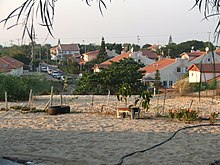













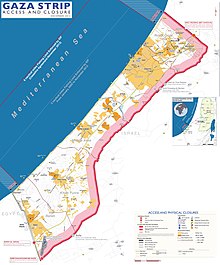





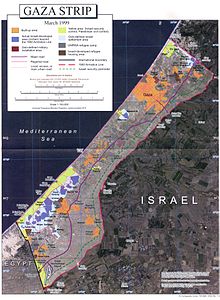
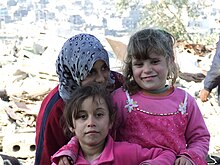






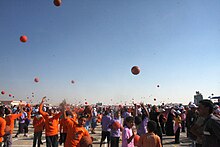

Gaza CityGaza GovernorateGaza Strip (film)Palestinian flagUN OCHAPalestinian National AuthorityOslo AccordsadministeredState of Palestineoccupied territoryGaza blockadeArabicEthnic groupsPalestinianSunni IslamofficialChristianityDemonym(s)Hamas temporary committeePopulationIsraeli new shekelEgyptian poundPalestine Standard TimePalestine Summer TimeISO 3166 codeMediterranean SeaPalestinian territoriesWest BankPalestinian refugees and their descendantsmost densely populated territories in the worldIsraelIsraeli occupationwas controlledKingdom of Egypt1948 Arab–Israeli warfled or were expelled1948 Palestine warSix-Day Warits decades-long military occupationPalestinian Authoritysecularelectoral defeat in 2006Sunni Islamicgovernance of Gazaa battleunilaterally withdrew its military forcesits settlementsblockade of Gazastill consideredinternational lawcollective punishmentGaza wargenocidePalestinianspopulation densitiesPalestinian refugeesPalestinian Christian39th-highestarea's 97% literacy rate is higherPalestinian nationalismHamas governmentNorth GazaDeir al-BalahKhan YunisHistory of Gaza CityPalestine regionOttoman EmpireBritish Empirethe region's international borderCentral PowersWorld War Ipartition of the Ottoman EmpireMandatory PalestineAll-Palestine ProtectorateAll-Palestine GovernmentUnited NationsArab LeagueTransjordanLebanonSaudi ArabiaIsrael–Egypt Armistice AgreementSuez CrisisSinai PeninsulaGamal Abdul NasserIsrael Defense ForcesSherman tanksPalestinian fedayeenan alleged massacremachine gunsHenry Labouissekilled 111 peopleRafah refugee campJean-Pierre FiliuOccupation of the Gaza Strip by EgyptChe Guevarathose who fled or were expelled from their homesIsraeli Military GovernorateAriel SharonYom Kippur WarTom SegevSecurity CabinetbrainstormedLevi EshkolAmerican Near East Refugee AidIsraeli settlementGush Katifsmall kibbutzJewish Agency's11 points in the NegevMorrison-Grady Planeconomic growth rateSara RoyEgypt–Israel peace treatyPhiladelphi RoutePhiladelphi corridorFirst IntifadaIsraeli-occupied1967 Arab–Israeli WarMadrid Conference of 1991Jabaliarefugee campcivil disobediencegraffitibarricadingthrowing of stonesMolotov cocktails